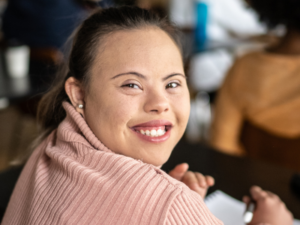The government has published the new Oliver McGowan draft code of practice on statutory learning disability and autism training, which sets out the standards required of this training.
 The Oliver McGowan draft code of practice has been developed to support the implementation of the statutory requirement, introduced by the Health and Care Act 2022, for all health and social care workers to receive appropriate, high-quality training on learning disability and autism.
The Oliver McGowan draft code of practice has been developed to support the implementation of the statutory requirement, introduced by the Health and Care Act 2022, for all health and social care workers to receive appropriate, high-quality training on learning disability and autism.
Staff working at all levels across all CQC-registered health and social care settings are required to undergo this training, and the draft code of practice defines the standards that training courses need to meet in terms of content and delivery.
It also explains how registered health and social care providers should use the code and what actions may be taken against those who fail to comply with it.
The draft code, which was published by the Department of Health and Social Care on 19th June, must be laid in Parliament for 40 days before MPs and Lords vote to approve it.
As long as neither House resolves not to approve it, the code will become final on 6th September 2025.
What does the Oliver McGowan draft code of practice include?
There are 5 sections to the draft code of practice:
- Section 1 sets out the four key standards for learning disability and autism training
- Section 2 includes related guidance
- Section 3 describes the Oliver McGowan Mandatory Training Framework on Learning Disability and Autism, including who it is for and how providers can access it
- Section 4 explains how registered providers should use the code
- Section 5 sets out how often the code will be reviewed
The four standards for training are:
- The curriculum must cover minimum capabilities from national frameworks, with all staff receiving basic awareness training and additional staff receiving more advanced training based on their roles
- Training should have a practical application, with learners able to apply it to their specific work settings, through case studies, discussions and real-world examples
- Training programmes must include live, interactive training which is co-produced and co-delivered by people with learning disabilities and autistic people. This should last for a minimum of 1 hour for awareness-level staff and 1 full day for care-providing staff
- Training must be evidence-based and quality-assured, with providers advised to use accredited, evaluated training that involves people with learning disabilities and autistic people in design and assessment
The code also sets out guidance for the procurement of training and monitoring and evaluating its impact.
How was the Oliver McGowan draft code of practice developed?
 Just as standard 3 mandates that training should be co-produced and co-delivered by people with a learning disability and autistic people, the government also consulted people with a learning disability and autistic people in developing the draft code. The consultation also included families and carers, the charitable sector, health and social care stakeholders and the CQC.
Just as standard 3 mandates that training should be co-produced and co-delivered by people with a learning disability and autistic people, the government also consulted people with a learning disability and autistic people in developing the draft code. The consultation also included families and carers, the charitable sector, health and social care stakeholders and the CQC.
They found that most people broadly supported the purpose and content of the Oliver McGowan draft code of practice on statutory learning disability and autism training.
The consultations highlighted 10 key themes, which were:
- Guidance on the appropriate level of training for staff.
- Availability of training packages.
- Guidance on making training content and delivery relevant for local contexts.
- Representation of personal experiences in training content and delivery.
- Guidance on support for co-trainers with personal experiences.
- Concerns regarding staff and service capacity to undertake training.
- Guidance on monitoring and evaluation.
- Clarity on CQC regulation.
- Expectations on accreditation.
- Clarity on re-doing training
The Oliver McGowan Mandatory Training Framework
 The draft code of practice also confirms that the Oliver McGowan Mandatory Training Framework is the government’s preferred and recommended route to meet the statutory training requirements introduced by the Health and Care Act 2022.
The draft code of practice also confirms that the Oliver McGowan Mandatory Training Framework is the government’s preferred and recommended route to meet the statutory training requirements introduced by the Health and Care Act 2022.
The code includes a detailed account of Oliver’s story, as told by his mother, Paula McGowan OBE.
Paula explains that, tragically, “Oliver died because clinicians did not understand learning disability, autism and how this affects a person.”
She adds:
“I believed that all health and social care staff should receive appropriate and meaningful training to help them understand people who have a learning disability or are autistic or both. During the inquest into Oliver’s death, it became apparent that health and social care staff did not receive this training. I felt so strongly this was wrong – firstly for patient safety, but also that clinicians are not given the skills to help and support people like Oliver when they are in sensory crisis and overload, especially when they are ill.
“[…] The response to The Oliver McGowan Mandatory Training has been outstanding, with many attendees saying it has empowered them to change their practices.”
In the ministerial foreword to the draft code of practice, Stephen Kinnock, Minister of State for Care, says:
“I have had the privilege of meeting with Oliver’s parents, Paula and Tom, and thank them for their contribution to the development and ongoing delivery of The Oliver McGowan Mandatory Training on Learning Disability and Autism. The training is named in Oliver’s memory, in recognition of his story, his family’s continued campaigning for better training for staff, and to remember him and others whose lives were cut tragically short.
“I have heard about the difference Oliver’s Training is making to the lives of people with a learning disability and autistic people, their families and carers, and to many dedicated health and social care staff.
“Oliver’s Training represents and clearly demonstrates the standard that the government expects training in this area to meet, as set out in further detail in this code of practice. It is the government’s recommended training package to support providers to meet the new legal requirement for learning disability and autism training. I have completed the first part of this training myself and found it to be insightful and impactful.”
Health and social care providers can, however, use alternative training programmes as long as they meet the standards set out in the code of practice.
Delivering training to meet the Oliver McGowan draft code of practice
 First Response Training (FRT) was one of the first training providers in the country to be approved to offer essential training in line with the Oliver McGowan Mandatory Training on Learning Disability and Autism.
First Response Training (FRT) was one of the first training providers in the country to be approved to offer essential training in line with the Oliver McGowan Mandatory Training on Learning Disability and Autism.
The national training provider aims to empower and educate staff to transform their practice by embracing the lived experiences of autistic individuals and those with learning disabilities. Through the collaborative strength of their trios—facilitating trainers and experts with lived experience — FRT aims to inspire lasting change in how individuals are understood, supported, and valued.
Leon Williams, Lead Director at FRT, says:
“We must acknowledge the incredible work of Paula McGowan, whose tireless campaigning has led to this training becoming a statutory requirement for all health and social care staff. Through the tragic loss of her son, Oliver, meaningful change is being made to improve the quality and standards within health and social care.”
One of FRT’s valued Expert with Lived Experience Co-Trainers, Laura Amy Williams, adds:
“It gives me a lot of reassurance to know there are so many people who want to understand autism and autistic people. As an expert with lived experience, I feel I can simply be myself and share my story.”
Since March 2023, FRT have delivered over 1000 Tier 1 webinars and over 700 Tier 2 courses. They have reached over 30,000 learners already, and will train many more in the coming months.
FRT are hosting a series of open, public Tier 2 courses in London, Manchester and Birmingham in the coming months. You can book a space on any of these courses online now.
FRT have also developed a free-to-download quick guide to the new Oliver McGowan draft code of practice.
This guide explains what the new code of practice means for health and social care providers, how to stay current, and how to meet new legal duties.
You can also download FRT’s free Oliver McGowan Mandatory Training brochure.
Providing an alternative training solution
 To offer health and care providers flexibility and choice, FRT have also developed their own Tier 2 Mandatory Autism and Learning Disabilities Training package.
To offer health and care providers flexibility and choice, FRT have also developed their own Tier 2 Mandatory Autism and Learning Disabilities Training package.
Fully mapped to the core capabilities framework, Oliver McGowan Mandatory Training Code of Practice and externally accredited, this package offers providers an efficient, affordable alternative solution.
Please note that, while fully interactive, this webinar-based training solution does not meet the code of practice’s requirement for the training to be ‘face-to-face’.
The training is designed to meet statutory standards and equip health and social care staff to deliver more empathetic, person-centred support.
A trainer at FRT explains:
“This isn’t just about compliance. It’s a chance to improve outcomes, reduce bias, and truly understand the lived realities of autistic individuals and people with learning disabilities.”
You can learn more about how FRT developed this training package here.
For further information on other types of neurodiversity training, visit their webpage or download the brochure.
You can contact FRT via freephone 0800 310 2300, send an e-mail to info@firstresponsetraining.com or submit an online enquiry.
